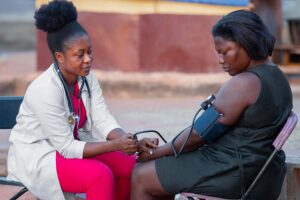Every year, millions of lives are saved through the simple act of blood donation. In Nigeria, the need for blood is constant, and the demand continues to rise. Blood donation is not just a kind gesture; it is a life-saving act that has the potential to change the course of someone’s life. Whether you’re donating blood, plasma, or even bone marrow, your contribution has the power to provide hope and healing to countless patients in need.
Why Blood Donation Matters in Nigeria
Nigeria, with a population of over 200 million, faces a critical shortage of blood donations. Hospitals across the country are often in dire need of blood for emergencies, surgeries, and treatments for chronic conditions. The importance of blood donation cannot be overstated – it is the backbone of life-saving medical procedures. When you donate blood, you become a beacon of hope for someone in desperate need.
Unfortunately, many Nigerians remain unaware of how their blood donation can make a difference. This lack of awareness has contributed to the chronic blood shortage in the country. By giving blood, you are ensuring that hospitals and blood banks are stocked with enough blood to meet the demands of patients, particularly in emergencies where every second counts.
What Are the Benefits of Blood Donation?
Beyond the satisfaction of knowing you’ve helped save a life, blood donation comes with significant health benefits for the donor as well. Regular blood donation can improve your heart health, reduce the risk of certain cancers, and even benefit your skin by reducing the iron levels in your body. Giving blood promotes the production of new blood cells, improving overall health and boosting your immune system.
How to Donate Blood in Nigeria
Donating blood in Nigeria is straightforward, but understanding the process can help alleviate any concerns. Blood donation centers and hospitals across Nigeria typically run regular blood drives, which are organized to make the process as convenient as possible for donors.
To donate blood, it’s essential to know your blood group and rhesus factor (whether you are Rh-positive or Rh-negative). Donors should be in good health, at least 18 years old, and weigh more than 50kg. For those interested in plasma donation, this process is similar to blood donation but focuses on collecting the plasma component of your blood, which is used to treat a variety of conditions, including burns, shock, and clotting disorders.
Plasma Donation and Other Types of Donations
Plasma donation is an incredibly valuable gift. Plasma is essential for treating conditions like burns, trauma, and shock. In Nigeria, the need for plasma is growing, with plasma centers and plasma donation centers working tirelessly to collect and store this critical resource. Plasma donations also play a vital role in supporting the production of life-saving medicines. Many people also choose to sell plasma for financial reasons, but it’s important to be cautious about selling blood plasma for profit. Always ensure that the facility is accredited and follows proper safety procedures.
Similarly, platelet donation is crucial for patients with blood disorders or those undergoing chemotherapy. Platelets help with clotting and are vital for people with conditions like leukemia. You can also consider bone marrow donation or even stem cell donation, which provide life-saving treatments for individuals with blood cancers like leukemia.
The Risks of Not Donating Blood
One of the biggest risks of not donating blood is the lack of availability for those in need. Without sufficient blood reserves, hospitals struggle to provide life-saving care, especially in cases of emergencies, surgeries, and trauma. The delay in receiving blood could cost someone their life. The more people donate, the more lives can be saved.
For many Nigerians, the thought of donating blood can be intimidating, but it is a safe and simple process. The risks are minimal, and the benefits far outweigh them. When you donate, a healthcare professional ensures that you are comfortable throughout the entire procedure. Oneus in Nigeria ensures that your donation is handled safely, and that your blood is used for the greatest good.
The Need for Awareness
Many Nigerians are unaware of the true importance of blood donation, including options like umbilical cord blood banking and private cord blood banking, which are gaining popularity for their potential to treat various medical conditions. There is a growing need for blood donation websites and platforms that educate people on where to donate blood and how to contribute to blood drives in their communities.
How You Can Make a Difference
Oneus is committed to ensuring that blood plasma, blood donation, and related services are easily accessible to Nigerians. By partnering with local blood centers and clinics, Oneus facilitates the blood donation process, making it easier for you to contribute to the life-saving cause. You can be a part of this mission by donating blood, plasma, or even registering to donate bone marrow.
Donating blood is not just a gift to others; it’s a gift to yourself. The selflessness you show today can bring hope and healing to someone’s life tomorrow.
Give Blood, Save a Life – Book Your Donation Now!
It’s time to act. Donating blood is one of the simplest yet most powerful things you can do to help save lives in Nigeria. Join Oneus in Nigeria today and make a life-changing difference. For more information, contact us at info@oneusng.com or call +234 902 168 2822. You can also visit our website at https://www.oneusng.com/ to book your donation.




